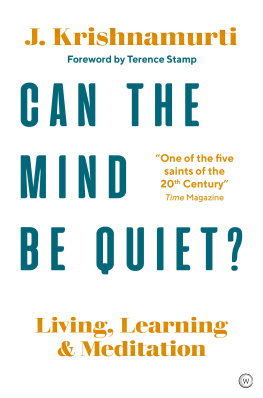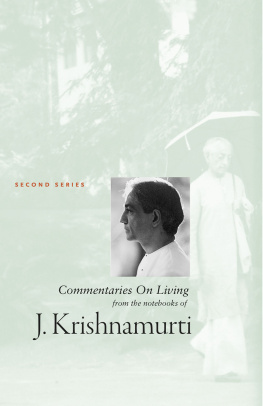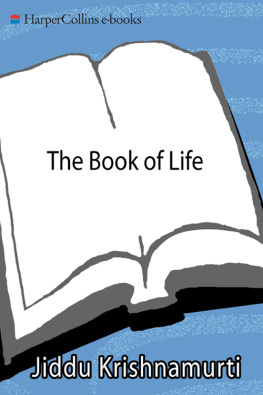Krishnamurti - Living in an Insane World
Here you can read online Krishnamurti - Living in an Insane World full text of the book (entire story) in english for free. Download pdf and epub, get meaning, cover and reviews about this ebook. publisher: Krishnamurti Foundation of America, genre: Religion. Description of the work, (preface) as well as reviews are available. Best literature library LitArk.com created for fans of good reading and offers a wide selection of genres:
Romance novel
Science fiction
Adventure
Detective
Science
History
Home and family
Prose
Art
Politics
Computer
Non-fiction
Religion
Business
Children
Humor
Choose a favorite category and find really read worthwhile books. Enjoy immersion in the world of imagination, feel the emotions of the characters or learn something new for yourself, make an fascinating discovery.

- Book:Living in an Insane World
- Author:
- Publisher:Krishnamurti Foundation of America
- Genre:
- Rating:3 / 5
- Favourites:Add to favourites
- Your mark:
- 60
- 1
- 2
- 3
- 4
- 5
Living in an Insane World: summary, description and annotation
We offer to read an annotation, description, summary or preface (depends on what the author of the book "Living in an Insane World" wrote himself). If you haven't found the necessary information about the book — write in the comments, we will try to find it.
Living in an Insane World — read online for free the complete book (whole text) full work
Below is the text of the book, divided by pages. System saving the place of the last page read, allows you to conveniently read the book "Living in an Insane World" online for free, without having to search again every time where you left off. Put a bookmark, and you can go to the page where you finished reading at any time.
Font size:
Interval:
Bookmark:
Living in an Insane World
Copyright 1989 by the Krishnamurti Foundation of America and the Krishnamurti Foundation Trust, Ltd.
Living in an Insane World
A Selection of Passages from the Teachings
of J. Krishnamurti
Contents
Foreword
The passages in this volume have been directly copied from books by Krishnamurti. These books include public talks, questions and answers, conversations and writings.
Krishnamurti always spoke from such a large perspective that his whole vision was implied in any extended passage. But if one wishes to see how a statement flows out of his whole discourse, one can find the context by referring to the book indicated. So doing may be invaluable for deeper comprehension of the passages.
Talking things over together as two friends...
In a few days we are going to have discussions, and we can start those discussions this morning. But if you assert and I assert, if you stick to your opinion, to your dogma, to your experience, to your knowledge, and I stick to mine, then there can be no real discussion because neither of us is free to inquire. To discuss is not to share our experiences with each other. There is no sharing at all; there is only the beauty of truth, which neither you nor I can possess. It is simply there.
To discuss intelligently, there must also be a quality not only of affection but of hesitation. You know, unless you hesitate, you cant inquire. Inquiry means hesitating, finding out for yourself, discovering step by step; and when you do that, then you need not follow anybody, you need not ask for correction or for confirmation of your discovery. But all this demands a great deal of intelligence and sensitivity.
By saying that, I hope I have not stopped you from asking questions! You know, this is like talking things over together as two friends. We are neither asserting nor seeking to dominate each other, but each is talking easily, affably, in an atmosphere of friendly companionship, trying to discover. And in that state of mind we do discover, but I assure you, what we discover has very little importance. The important thing is to discover, and after discovering, to keep going. It is detrimental to stay with what you have discovered, for then your mind is closed, finished. But if you die to what you have discovered the moment you have discovered it, then you can flow like the stream, like a river that has an abundance of water.
Collected Works of J. Krishnamurti, Vol. XV
Saanen, Switzerland, 10th Public Talk, 1 August 1965
I. Krishnamurti in the World War II Period
We have had thousands and thousands of wars and we are everlastingly talking about peace; but the way we live our daily life is war, a battlefield, a conflict. And we accept that as being inevitable. We have never asked ourselves whether we can live a life of complete peace, which means without conflict of any kind. Conflict exists because there is contradiction in ourselves. That is fairly simple. In ourselves there are different contradictory desires, opposing demands, and this brings conflict. We have accepted all these things as inevitable, as part of our existence; we have never questioned them.
You Are the World , U.C. Berkeley, Talk 1
The world is myself
The world is ever in pain, in confusion; it has ever this problem of struggle and sorrow. We become conscious of this conflict, this pain, when it affects us personally or when it is immediately about us, as now. The problems of war have existed before, but most of us have not been concerned with them as they were remote and not affecting us personally and deeply; but now war is at our door and that seems to dominate the minds of most people.
Now I am not going to answer the questions that must inevitably arise when one is immediately concerned with the problems of war, what attitude and action one should take with regard to it, and so on. But perhaps we shall talk over together a much deeper problem, for war is only an outward manifestation of inward confusion and struggle of hate and antagonism. The problem that we should discuss, which is ever present, is that of the individual and his relationship with another, which is society. If we can understand this complex problem, then perhaps we shall be able to avoid the many causes that ultimately lead to war. War is a symptom, however brutal and diseased, and to deal with the outer manifestation without regard to the deeper causes of it, is futile and purposeless; in changing fundamentally the causes, perhaps we can bring about a peace that is not destroyed by outer circumstances.
Most of us are apt to think that through legislation, through mere organization or through leadership, the problems of war and peace and other human problems can be solved. As we do not want to be responsible, individually, for this inner and outer turmoil in our lives, we look to authorities, groups, and mass action. Through these outward methods one may have temporary peace, but one can have that abiding, lasting peace only when the individual understands himself and his relationship with another, which makes society. Peace is within and not without; there can only be peace and happiness in the world when the individualwho is the worldsets about definitely to alter the causes within himself which produce confusion, sorrow, hate, and so on. I want to deal with these causes and how to change them, deeply and lastingly.
The world about us is in constant flux, constant change; there is incessant sorrow and pain. Amidst this mutation and conflict, can there be lasting peace and happiness, independent of all circumstances? This peace and happiness can be discovered, hewn out of whatever circumstances the individual finds himself in. During these talks, I shall try to explain how to experiment with ourselves and thus free thought from its self-imposed limitations. But each one must experiment and live strenuously and not merely live on superficial action and phrases.
This earnest experiment must begin with ourselves, with each one of us, and it is vain merely to alter the outward conditions without deep, inward change. For what the individual is, society is; what his relationship is with another is the social structure of society. We cannot create a peaceful, intelligent society if the individual is intolerant, brutal, and competitive. If the individual lacks kindliness, affection, thoughtfulness, in his relationship with another, he must inevitably produce conflict, antagonism, and confusion. Society is the extension of the individual; society is the projection of ourselves. Until we grasp this and understand ourselves profoundly and alter ourselves radically, the mere change of the outer will not create peace in the world, nor bring to it that tranquillity that is necessary for happy social relationship.
So let us not think of only altering the environment; this will and must take place if our whole attention is directed to the transformation of the individual, of ourselves, and our relationship with another. How can we have brotherhood in the world if we are intolerant, if we hate, if we are greedy? Surely this is obvious, isnt it? If each of us is driven by a consuming ambition, striving for success, seeking happiness in things, surely we must create a society that is chaotic, ruthless, and destructive. If all of us here understand and agree deeply on this point, that the world is ourselves and what we are the world is, then we can proceed to think how to bring about the necessary change in ourselves. So long as we do not agree on this fundamental thing, but merely look to the environment for our peace and happiness, it assumes that immense importance which it has not, for we have created the environment, and without radical change in ourselves, it becomes an intolerable prison. We cling to the environment, hoping to find security and self-identified continuity in it, and thus resist all change of thought and values. But life is in continual flux and so there is constant conflict between desire which must ever become static and that reality which has no abode.
Next pageFont size:
Interval:
Bookmark:
Similar books «Living in an Insane World»
Look at similar books to Living in an Insane World. We have selected literature similar in name and meaning in the hope of providing readers with more options to find new, interesting, not yet read works.
Discussion, reviews of the book Living in an Insane World and just readers' own opinions. Leave your comments, write what you think about the work, its meaning or the main characters. Specify what exactly you liked and what you didn't like, and why you think so.










